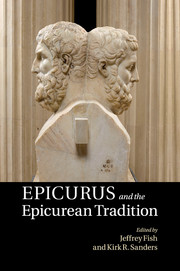Book contents
- Frontmatter
- Contents
- Acknowledgements
- Note on Abbreviations
- List of Contributors
- 1 Introduction
- 2 Autodidact and student: on the relationship of authority and autonomy in Epicurus and the Epicurean tradition
- 3 Epicurus' theological innatism
- 4 Epicurus on the gods
- 5 Not all politicians are Sisyphus: what Roman Epicureans were taught about politics
- 6 Epicurean virtues, Epicurean friendship: Cicero vs the Herculaneum papyri
- 7 Cicero's use and abuse of Epicurean theology
- 8 The necessity of anger in Philodemus' On Anger
- 9 Philodemus, Seneca and Plutarch on anger
- 10 Philodemus and the fear of premature death
- Bibliography
- General index
- Index of passages
9 - Philodemus, Seneca and Plutarch on anger
Published online by Cambridge University Press: 01 June 2011
- Frontmatter
- Contents
- Acknowledgements
- Note on Abbreviations
- List of Contributors
- 1 Introduction
- 2 Autodidact and student: on the relationship of authority and autonomy in Epicurus and the Epicurean tradition
- 3 Epicurus' theological innatism
- 4 Epicurus on the gods
- 5 Not all politicians are Sisyphus: what Roman Epicureans were taught about politics
- 6 Epicurean virtues, Epicurean friendship: Cicero vs the Herculaneum papyri
- 7 Cicero's use and abuse of Epicurean theology
- 8 The necessity of anger in Philodemus' On Anger
- 9 Philodemus, Seneca and Plutarch on anger
- 10 Philodemus and the fear of premature death
- Bibliography
- General index
- Index of passages
Summary
Philosophers of Hellenistic and Roman times, even those belonging to different schools, found themselves in increasingly close association with one another. This was especially the case with those who lived and worked in Italy during the late Republic or the imperial period, but the same could also be said to some extent for those intellectuals living in the provinces who remained in close contact with the philosophical centres. The philosophical production of these centuries is characterized by eclecticism (i.e., a willingness to draw selectively from various traditions whatever elements seem best suited to one's purposes) and by syncretism (i.e., a tendency towards the fusion of diverse elements into new, distinct philosophical systems). Both syncretism and eclecticism are arguably to be found in Philodemus' Epicureanism, Seneca's Stoicism and Plutarch's various endeavours, Platonic and otherwise. Both features can also be traced to different extents in the writings of these authors on the emotion of anger.
It is a matter of some controversy whether Seneca and Plutarch had access to, or took account of, Philodemus' On Anger (De ira). Certainly neither Seneca's De ira nor Plutarch's On the Control of Anger contains any explicit reference to the earlier treatise by Philodemus. Nevertheless, there is some reason to believe that both Seneca and Plutarch would have had access either to Philodemus' treatises, or at least to material from the Epicurean scholarch Zeno of Sidon that Philodemus incorporated into his own writing.
- Type
- Chapter
- Information
- Epicurus and the Epicurean Tradition , pp. 183 - 210Publisher: Cambridge University PressPrint publication year: 2011
- 3
- Cited by



